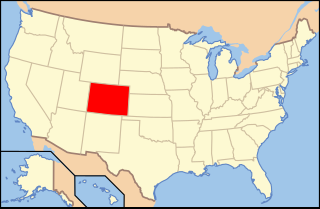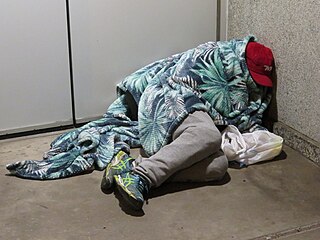
A motel, also known as a motor hotel, motor inn or motor lodge, is a hotel designed for motorists, usually having each room entered directly from the parking area for motor vehicles rather than through a central lobby. Entering dictionaries after World War II, the word motel, coined as a portmanteau of "motor hotel", originates from the defunct lodging compound establishment; The Milestone Mo-Tel in San Luis Obispo, California, which was built in 1925. The term referred to a type of hotel consisting of a single building of connected rooms whose doors faced a parking lot and in some circumstances, a common area or a series of small cabins with common parking. Motels are often individually owned, though motel chains do exist.

In criminology, the broken windows theory states that visible signs of crime, antisocial behavior and civil disorder create an urban environment that encourages further crime and disorder, including serious crimes. The theory suggests that policing methods that target minor crimes, such as vandalism, loitering, public drinking and fare evasion, help to create an atmosphere of order and lawfulness.

In law, breed-specific legislation (BSL) is a type of law that prohibits or restricts particular breeds or types of dog. Such laws range from outright bans on the possession of these dogs, to restrictions and conditions on ownership, and often establishes a legal presumption that such dogs are dangerous or vicious to prevent dog attacks. Some jurisdictions have enacted breed-specific legislation in response to a number of fatalities or maulings involving pit bull–type dogs or other dog breeds commonly used in dog fighting, and some government organizations such as the United States Army and Marine Corps have taken administrative action as well. Due to opposition to such laws in the United States, anti-BSL laws have been passed in 21 of the 50 state-level governments, prohibiting or restricting the ability of jurisdictions within those states to enact or enforce breed-specific legislation.

A local ordinance is a law issued by a local government such as a municipality, county, parish, prefecture, or the like.
A civil gang injunction or CGI is a type of restraining order issued by courts in the United States prohibiting gang members in particular cities from participating in certain specified activities. It is based on the legal theory that gang activity constitutes a public nuisance that can prevent non–gang members of the community from enjoying peace and public order. An injunction is obtained against the gang itself, after which the police and district attorney may decide against whom they will enforce it. Law enforcement use gang injunctions as a tool to label people as gang members and restrict their activities in a defined area (ACLU).

Noise regulation includes statutes or guidelines relating to sound transmission established by national, state or provincial and municipal levels of government. After the watershed passage of the United States Noise Control Act of 1972, other local and state governments passed further regulations.

Asset forfeiture or asset seizure is a form of confiscation of assets by the authorities. In the United States, it is a type of criminal-justice financial obligation. It typically applies to the alleged proceeds or instruments of crime. This applies, but is not limited, to terrorist activities, drug-related crimes, and other criminal and even civil offenses. Some jurisdictions specifically use the term "confiscation" instead of forfeiture. The alleged purpose of asset forfeiture is to disrupt criminal activity by confiscating assets that potentially could have been beneficial to the individual or organization. Asset forfeiture was found to generally increase with the percentage of the assets retained depending on electoral incentives.
The Government of Denver makes up the public sector of the City and County of Denver, Colorado.
Nightlife legislation of the United States is mostly in local jurisdiction of the city or state.

Graffiti are writing or drawings scribbled, scratched, or sprayed illicitly on a wall or other surface in a public place. Graffiti ranges from simple written words to elaborate wall paintings. Graffiti, consisting of the defacement of public spaces and buildings, remains a nuisance issue for cities.

Gun laws in Colorado regulate the sale, possession, and use of firearms and ammunition in the state of Colorado in the United States.
The idea of regulatory crime control is to reduce and control crime. Many factors can make a place or area a victim of criminal activity. John and Emily Eck, two primary scholars that work within the area of regulatory crime control, explain how places can either create crime opportunities or crime barriers (2012). Eck also defines the two types of regulatory crime control strategies as ends-based and means-based. He states that means-based strategies focus on the use of different procedures and technologies, while ends-based strategies concentrate on the overall outcome (2012). Another primary scholar, Graham Farrell, discusses how repeat victimisation is becoming an important area for policing and crime control.

Homelessness in the United States has differing rates of prevalence by state. The total number of homeless people in the United States fluctuates and constantly changes, hence a comprehensive figure encompassing the entire nation is not issued, since counts from independent shelter providers and statistics managed by the United States Department of Housing and Urban Development vary greatly. Federal HUD counts hover annually at around 500,000 people. Point-in-time counts are also vague measures of homeless populations and are not a precise and definitive indicator for the total number of cases, which may differ in both directions up or down. The most recent figure for 2019, was 567,715 individuals nationally that experienced homelessness at a point in time during this period.

Homelessness is a growing problem in Colorado and is considered the most important social determinants of health. Homelessness is very difficult for many Coloradoans to escape due to the continuous increase in costs for housing in Colorado, along with mental health treatments and other factors. When people are forced to live without stable shelter, they are then exposed to a number of risk factors that affect physical and mental health. Although it is difficult to pin point any one cause of homelessness, there is a complicated combination of societal and individual causes.

Homelessness is a serious issue throughout the state of New Mexico. Through a demographic examination it becomes evident that New Mexico has a high proportion of ethnographies that are currently and historically socioeconomically disadvantaged. Native Americans as a proportion of the US population represent the second highest amongst all States with only Alaska having a higher ratio, while it also has a large Hispanic population. Homelessness is a direct cause from an individual not being able to provide themselves with the most basic of necessities to maintain a healthy life hence having a higher proportion of individuals in poverty places a greater risk of an individual becoming homeless.
The Alpine Motel Apartments fire occurred in downtown Las Vegas, Nevada, on December 21, 2019. The three-story building, constructed in 1972, had failed several fire inspections and received numerous code enforcement complaints in the years prior to the fire. Some residents did not have working heaters and were using their kitchen stoves for warmth, which led to the fire. It killed six residents and injured 13 others. It is the deadliest fire to occur in Las Vegas city limits. As a result, the city increased its inspections of older apartment buildings.
A nuisance ordinance, also referred to as a crime-free ordinance or a disorderly house ordinance, is a local law usually passed on the town, city, or municipality level of government that aims to legally punish both landlords and tenants for crimes that occur on a property or in a neighborhood. These laws impose penalties under programs referred to as nuisance abatement when crimes are reported, regardless of whether crimes actually occurred or what the police action entailed. The result of these ordinances is for landlords to tell tenants to not report crimes, refuse to renew the lease of anyone involved in reporting a crime, and eviction of tenants involved in any crimes, even if the tenants were the victims of said crimes.
Notices of violation are issued from Code Enforcement by local cities or towns when properties may be contrary to local codes and regulation, vehicles are substandard, inoperable or may have constituted a public nuisance. The ordinances under which violation notices or statements are performed vary from one country to another and between cities within a country or states.
The Crime-Free Multi-Housing (CFMH) program is a crime-free ordinance program, which partners property owners, residents, and law-enforcement personnel in an effort to eliminate crime, drugs, and gang activity from rental properties.










